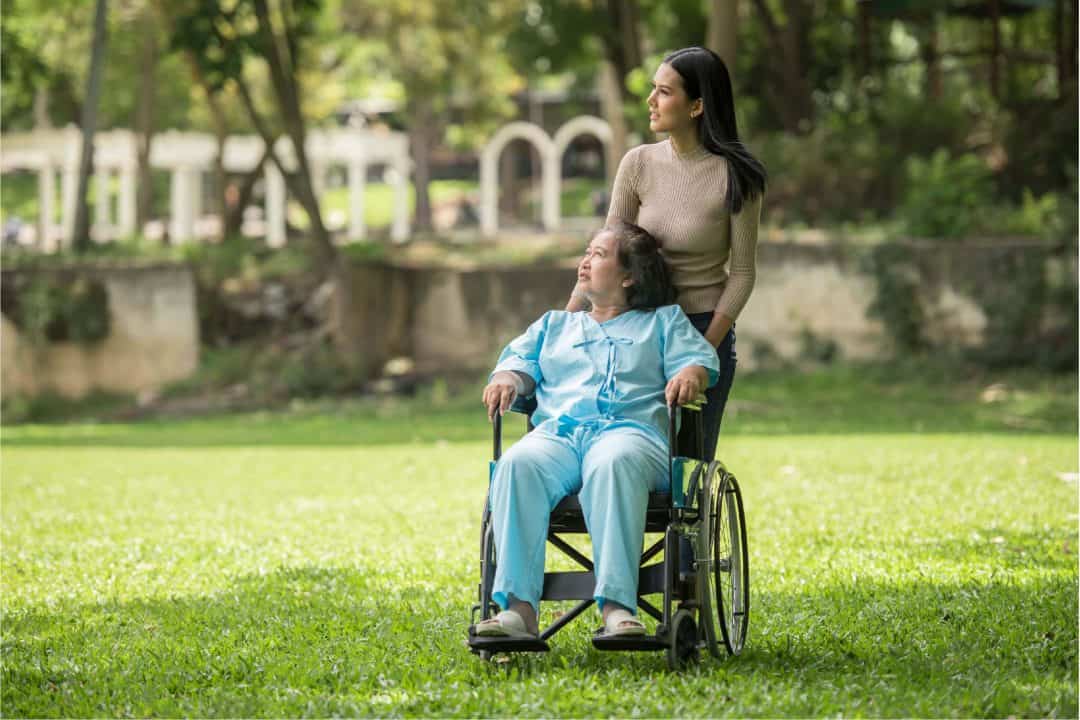Caregiver Stress – How to prevent burnout and deal with fatigue?
Caretakers in Singapore face a tough and daunting tasks. Not only do they have to shoulder the physical work of taking care, they also face huge mental challenges in facing numerous problems in Singapore. You may become a caregiver (or caretaker) as your parents or elder relatives start to age, and their physical, mental and emotional state gradually changes. It is a challenging part of our lives not just for the elderly but for the other family members as they started to learn how to be caregivers and take on new chores in the family. There is a recent study by Tan Tock Seng Hospital – Institute of Geriatrics and Active Ageing that reveals that 40% to 60% of caregivers of people with dementia suffer from significant stress.
Caregiver syndrome or caregiver stress
Taking care of your loved ones, whether out of love or out of obligation, who are chronically ill or disabled can eventually change your life. From being able to holiday frequently or hang out with friends every Friday night to staying at home in order to take good care of your parents while dealing with their tantrums can be a stressful job. Indeed, long-term caregiving situation is an overwhelming task. There are lots of stress involved in caregiving. It can be financial stress, physical stress or mental stress.

When stress is not managed properly, it can affect yourself. Moreover, your ability to provide care to your loved ones will also be affected. So, before the stress takes over your life, it is important that you understand the caregiver burnout and be knowledgeable to its causes and signs in order to prevent it.
Caregiver Financial Stress
Caregiver financial stress mostly involved the high cost of medicine, health care. Even healthy elderly citizens require retrofitting the home to make it elderly friendly, such as bathroom handles, anti-slip tiles, etc. You may also need to buy and maintain walking sticks, wheelchairs, ramps, etc. Medications can be expensive too, especially for the less common illness that has expensive treatments. Nutrient-rich milk powder or liquid, meant for the elderly or sickly can be quite costly too. Because the elderly may eat less balanced meals and have some deficiencies, these daily nutrient, vitamins or supplements can add up to great financial stress for caregivers.
Caregiver Physical Stress
Physically, caregivers themselves may be aging themselves too, with weakening muscles and less strength. Yet they have to face the daunting tasks of helping an even elder relative with physical tasks. Simple tasks like bathing, going from room to room may need physical assistance and caretaking. The caregiver may find much of his time spent on menial physical tasks that can be tiring. If the elderly are bedridden or wheelchair-bound, a lot of strength may be required to transfer from wheelchairs to beds, chair etc. That can be physically tiring and stressful for the caregivers, especially that the caregivers are also of old age. Another example, parents who care for their children who are growing up, are getting older themselves too and are getting frail.
Caregiver Mental or Emotional Stress
Mental stress can be extremely difficult for caregivers. Caregivers face his own private life and chores, which can be his work responsibilities and family commitment, and yet face extra commitment to his elderly relatives. Splitting his precious time and resources over different important priorities can be painful and heart-wrenching. A better doctor or medical care may mean cutting back on his education plans for his own kids and is mentally punishing. If the elderly suffer from dementia, the lack of memories and unable to recognize the caregiver as a relative can be painful, hurtful and unforgiving. The caretakers can feel isolated and emotionally stressed from dealing with family tensions or financial issues. Needless to add, the physical stress, financial stress involved all lead to mental stress and frustration too.
What is caregiver burnout, its causes, and symptoms?

Caregiver burnout is a condition when the caretaker is physically, mentally and/or emotionally exhausted that his attitude towards his ward shifted from being caring to being unconcerned. Burnout usually happens when you feel that you are alone and pressured at the same time. It can be physical stress (muscle aches), financial stress (unable to pay bills or skipping some recreational hobbies). You may experience depression, stress, fatigue, anxiety and/or the feeling of guilt when you are having fun with your friends instead of staying at home. Although caregiving is a fulfilling job knowing that you spend quality time with your loved ones by taking good care of them, this challenging responsibility can also drain you at the same time. Fatigue eventually occurs when you are too busy caring for them to the extent of neglecting your own physical, emotional as well as spiritual health. Caregiving becomes stressful also when, despite your unending assistance and efforts, their condition is steadily deteriorating and there’s no hope that they will get better. This stress can lead to burnout especially when you don’t talk or get support from anyone.
Caregivers Burnout Contributing Factors
On the other hand, some of the contributing factors that can lead to your burnout may be the following:
- When you set unrealistic expectations— Caregiving for the first time can excite you. You will be flooded by lots of ideas on how to take care of your loved ones. This will lead you to set unrealistic expectations. At the back of your mind, you want to be the hero of their life. You want to be their source of happiness in order to have positive on their health. But unrealistic expectations may burn you out especially if your parents are diagnosed with having conditions that severely affect their brain such as Alzheimer’s disease.
- When you cannot control things anymore— When you plan in your mind the things you need to accomplish for the day but things happen the other way around, it frustrates you. So instead of trying to be patient to your parents, your little frustration may, sooner or later, lead to anger.
- When you get confused by your different roles—Aside from being a caregiver, you are also a spouse, lover, parent, friend and etc to someone. Confusion takes place when these roles also demand your time. This feeling of confusion might eventually lead to burnout when some of your roles are neglected because you cannot any more manage your time.
- When you do not acknowledge your feelings and still trying to pretend that you are still happy caregiving— Caregiving, as stated above, is an overwhelming task that will consume your energy. Stress adds up when you do not recognize that you are tired and already burnt out. Acknowledging it may help you get the help you needed.
What are some symptoms of caregiver burnout?
Now that you have an idea what caregiving burnout all about and some of its causes, knowing its symptoms may be helpful to you as well.
- Always worried
- Lack of energy
- Lack of energy and interest in things previously enjoyed
- Problem in sleeping
- Uncontrollable mood swings that may lead to depression
- Changes in eating habits, usually no appetite, that may cause of changes in weight
- Feeling hopeless, helpless, irritable and impatient especially with the person being taken care of
- Often gets sick particularly headaches and stomachaches
- Self-confidence declines that is why withdrawal from other family members and friends usually happen
- Become dependent to medication in order to cope up with everyday things
- Worried about the future because of they feel that they are trapped with caregiving
- Own physical and emotional needs are often neglected
How do you deal with caregiver stress?
You can prevent caregiver burn out by understanding that no man is an island, seek assistance and support. The very least is to talk about it. There are government agencies, voluntary organizations that are trying to help and it is definitely alright to seek help. You may want to reduce stress and prevent burn out by sharing and taking good care of yourself. Yes, it is very important for caregivers to take good care of themselves first.
How can you prevent caregiver burnout?
When your stress continues to be left unchecked, it can backfire on your health as well as your state of mind. When you are burnt out, doing simple things may become a tough task. That is why taking good care of yourself is necessary to handle the stress of caregiving. When you protect yourself from this burnout, you will be able to see hope in your life and balance your life effectively.
5 tips you can take to help you prevent caregiver burnout:

Give yourself a break and do not be guilty about it
At least once a month, give yourself a break in order to breathe. Get outside of your house, meet your friends and have fun. Find leisure activities that may bring you enjoyment so that you can release all the negativities in your mind and body. When you have your much-deserved rest, do not be guilty about it. Also, try to leave all your worries at home for a while when you are having fun so that you can enjoy every single time of your break. Thinking about your responsibilities while you are taking time-off is not advisable. This will not help you relax and recharge. De-stressing is important so that you can be more focused, feel more energetic and be more productive.
Celebrate small victories by pampering yourself
As stated above, burnout arises when you feel that you cannot control things anymore. This will discourage and dishearten you thinking that all your efforts and time are wasted. But when things started to happen according to your plan, it will motivate you. When good things occur such as finishing their food without so much mess, taking their medications without throwing some tantrums and being able to remember your name for those elders suffering from dementia, it is important to celebrate it and reward yourself. Pampering yourself for these small victories may include massage, take a long bath and light your scented candles, manicure/pedicure, haircut, eating in a fancy restaurant, watching a movie in cinema, reading a book, playing with your dogs, buying yourself a dress, or anything that can compensate your hard work.
Maintain your personal relationship
Caregiving can lead you to isolation because you become outdated of what is happening outside your home. During the night, instead of texting/calling your friends, you choose to sleep so that you have the strength for tomorrow’s work. However, no matter how busy you are caregiving, do not lose the strings that connect you with your friends. When you feel isolated and alone, this will lead to depression. But being surrounded with friends can keep you stay positive in life. Meeting them does not necessarily means weekly. If your time does not permit you, try to see them or other people at least once or twice a month. If you have difficulty leaving the house, let them visit you. Sharing your feelings and worries with them can help you ease the burden you are carrying.
Take care of yourself too
While you are taking good care of your loved ones, take care of yourself also. Caregiving will burn you out when you feel stressed and tired. Think of your body as a machine. When it is overworked and not properly maintained, problems will arise. So before trouble starts, do yourself a favor by taking care of your own physical, emotional and spiritual health. Eat healthy foods such as vegetables and fruits to nourish and fuel your body. Taking food supplements and vitamins can shield your body against diseases. Also, you should get enough sleep so you can have enough energy to do your tasks. When you feel so tired, get some light exercise to relieve the stress and tension in your body. It is an effective energy booster which can enhance your mood and fight fatigue. Practicing meditation or having daily relaxation can be beneficial to your well-being as well. Finally, visit your doctor regularly. When you are aiding your loved ones, getting sick is the thing you cannot afford.
Join a caregiver support group
Sharing your feelings and troubles to the people going through similar experience are beneficial to your well-being. In joining a caregiver support group, you do not have to leave the house often. There’s a lot of support group available online. When you join, accept that you need help and recognize your feelings. Talk about your problems and frustrations so that others can provide their assistance. The good thing about being in a support group is that you will be able to listen to others as well. You are not just getting the assistance you need but also giving help to others. This is a great way also to connect with others so that you won’t feel isolated knowing that others are in the same situation as well.
How do you deal with caregiver fatigue?

It is common to be fatigued as a caregiver. A piece of great advice is you charge your battery when there are 3 or 5 bars left, you do not wait till there is only 1 or 0 bar left to recharge. You will be damaging the battery lifespan and also giving yourself extra stress. Do take advantage of the many resources and assistance available to help you provide care for your loved one. To help manage caregiver stress:
- Connect to communities. Join communities or support groups. We have a list of groups at the end of this article. You can read their website, email them or call them. Many support groups do not just offer help, but tips and advice on how to best do the usual chores you face every day. Many services are available for all of us.
- Join 1 or more support groups. Tips and advice from people in the same shoes as you are the most valuable. A group can give you encouragement and advice. What you are going through is not new to them, so they may have a better suggestion. Make new friends, and you can support others too with your experience and advice.
- Be willing to accept help. Be willing to accept help from relatives, friends, and volunteers. It may be hard to let go, but you can start by preparing a list of ways how someone can help. For example, a volunteer or friend may offer to buy groceries, cook or take your ward for a walk a few times a week. Welcome some help.
- Seek social and friends’ support. Continue to talk and maintain friendships with family and friends who can offer support and assistance. Spend some time each week with friends and family, even if it is just a 30-minute chit-chat on the phone or a walk in the park.
- Take care and be healthy. Take care of yourself first so you can take care of others. Sleep well, eat healthier and relax at times. If you find it hard to be healthy, seek support and accept help. Sleep is a big problem with many caregivers. It may cause you health problems later, speak to a doctor or support group.
- Do what you can and be content. You are not perfect and you do not have to feel guilty. Accept that you are doing the best you can and do not blame yourself for anything.
- Set realistic goals. Starting a caregiver life can be daunting. Start with small steps, learn slowly, step by step. Establish a daily routine, adjust your tasks and ask family members to share in small tasks.
- See a doctor regularly. For any health issue, be sure to ask a doctor and let him know you are caretaker. For example, you may have back problems from lifting or weak knees from bending down often to help with caregivers’ tasks.
Respite Care or Nursing Homes
You may not like to leave your loved ones with a home or someone’s care, but sometimes a short break can recharge your energy and outlook for the one you are caring for. Many nursing homes or support groups provide short or long-term respite cares.
- In-home respite. Private nurses or health care aides visit your home to assist in taking care.
- Adult care centers and programs. Daycare centers and programs can provide care for both older adults and children, and it may be good for them to socialize more with others.
- Short-term nursing homes. Nursing homes and care centers do provide short-term stays when the caregivers need a rest
Final Thought
Caregiving is stressful. You feel powerless about the things you cannot control. Sometimes, you would feel that you fall into a trap in which you cannot go out anymore no matter what you do. That is why burnout is common for those caregivers who are in this situation for a long time. However, you can spare yourself from fatigue that would eventually lead to burnout. When things cannot be changed: accept that. Acceptance, when practiced, helps you understand better your loved ones. When they throw tantrums at you, think that nothing is personal. Do not burden yourself dwelling on things that may consume your energy for nothing. Be kind to yourself and do not let negativity stays in your heart and mind. Give yourself a reward for working hard.

A simple tap on your shoulder can uplift your weary soul. And finally, go out and meet other people. Being socially connected will help you think that you are not alone. With that, you do not let the caregiving take over your life.
Contact and Help for Caregivers Support Group in Singapore – Websites and Office
Relieve your caregivers’ burdens. Make the call or email them now =)
Touch Caregivers Support
Support for caregivers of elderly people. – Website: http://www.caregivers.org.sg – Contact: 68046555 (Weekdays, 9 am to 5 pm)
Caregivers Alliance
Support for caregivers of people with mental illness – Website: http://www.cal.org.sg – Contact: 67829371 (24 hours hotline run by Caregivers Association of the Mentally Ill)
Club Rainbow
Support for caregivers of chronically ill children – Website: http://www.clubrainbow.org – Contact: 63771789 (Weekdays, 9 am to 5 pm)
AWWA Caregiver Service
Support for caregivers of disadvantaged people:- eg, people with disabilities or the elderly. You can download a resource handbook in English or Chinese from their website: https://www.awwa.org.sg/our-services – Contact: 1800 2992992 (Weekdays, 9am to 6pm)
Minds Caregiver Support Services
By Movement for the Intellectually Disabled of Singapore. Support for Caregivers of people with special needs. – Website: https://www.awwa.org.sg/our-services – Contact: 65478503 (Weekdays, 8:30am to 5:30pm)
Alzheimer’s Disease Association Caregiver Support Group
Website: https://www.ktph.com.sg/ – Contact: 62939971 (Weekdays 9am to 5pm)
Other Useful Support group
Khoo Teck Phua Hospital
Website: https://www.ktph.com.sg/ Contact: 65558000 (Weekdays 9am to 5pm)
National University Hospital
Website: https://www.nuh.com.sg Contact: 67795555
Useful Links on Caregivers and Support Resources:
Silverpages
Website: http://www.silverpages.sg/caregiving
If you face issues with care-taking in Singapore, seek help. Visit forums and seek the above hotline to talk to people =)






